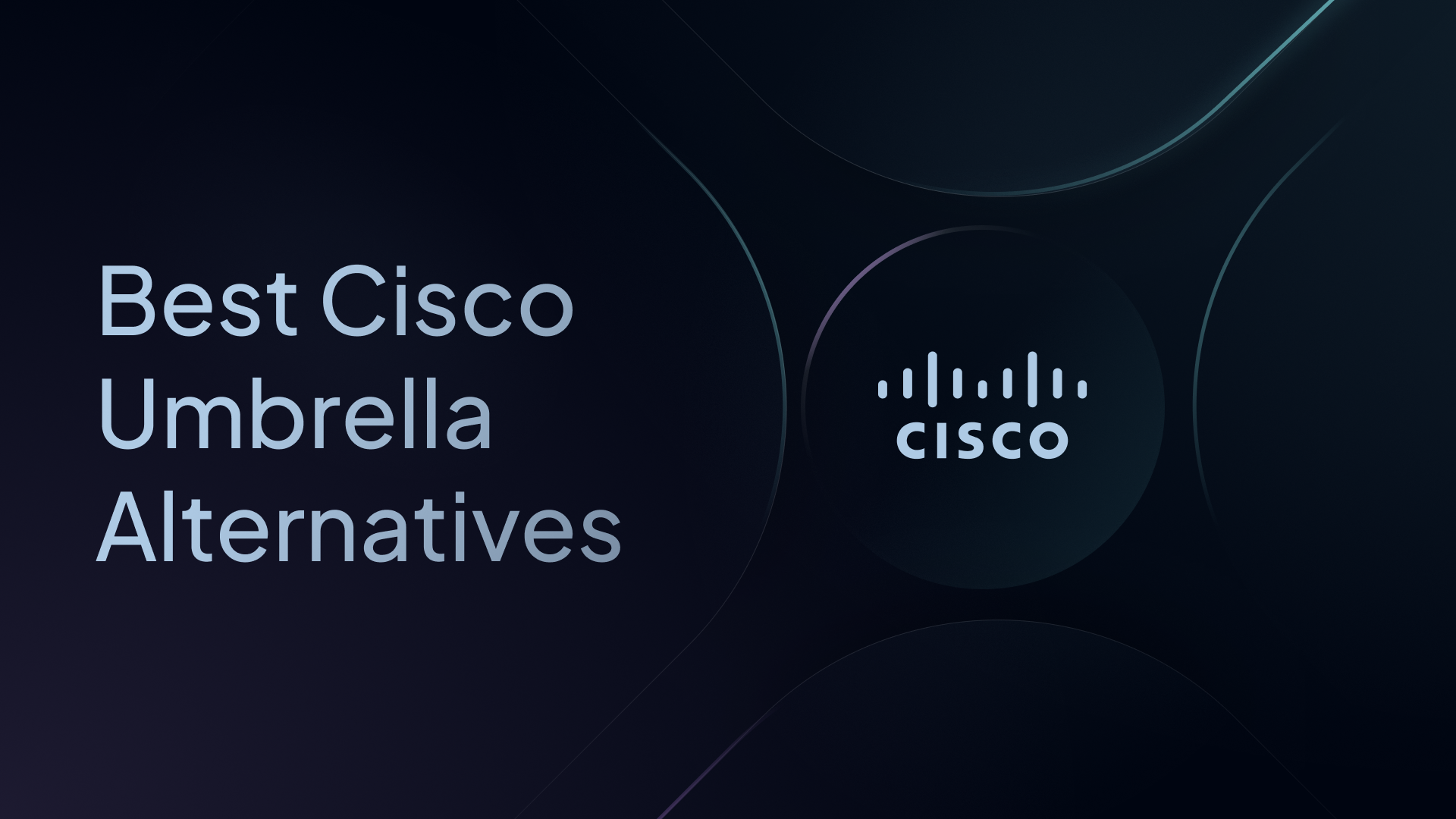Cisco is a juggernaut in the software, network, and cybersecurity space and has many solutions on offer.
Their DNS management product, Umbrella, is a popular service targeting enterprise-level organizations.
However, this has its pros and cons, and as we’re about to explore, it doesn't result in the best service on the market.
What's more, Cisco Umbrella also has had plenty of outages which is a cause for concern.
Let’s find out what alternatives you have to choose from and which one is the best.
1. Control D (Best All-Round Solution)
Control D is a versatile DNS management solution offering advanced filtering and highly customizable options to help businesses secure their networks.
With a user-friendly interface and features designed for flexible control, it’s packed with functionality.
Here’s an in-depth look at the unique advantages that make Control D a top recommendation.
Pricing
Cisco Umbrella does not advertise its pricing structure online. However, you can find information on their tiered plans. There are six plans to choose from: Umbrella DNS Essentials, Umbrella DNS Advantage, Umbrella SIG Essentials, Umbrella SIG Advantage, Secure Access Essentials, and Secure Access Advantage.
Reports online suggest that their DNS Essentials plan starts at $2.50/user/month, and prices can go as high as $28/user/month for the higher tiers, but this hasn’t been confirmed.
The tricky thing is that the Umbrella DNS product is simply a small cog in the larger Cisco solutions package. You may need to purchase other Cisco products to maximize Umbrella's functionality, which would drive up costs further.
Control D takes the complete opposite approach. Instead of plans, a distinction is made between organization types, which affects pricing. Businesses are charged $2/user/month, MSPs $1/user/month, and schools and non-profits receive a further lower rate.
This also means that Control D does not gatekeep features. All organization types automatically qualify for Control D’s full feature list and are also eligible to receive all new feature releases going forward.
Features
There’s considerable overlap between the features offered by Control D and Cisco Umbrella, such as:
- Malware and phishing protection
- Flexible content blocking
- Blockable Services (apps) - 1,000+ with Control D, fewer than 100 with Umbrella
- Modern DNS protocols support
- SIEM log streaming
- Single Sign-On (SSO)
There's one feature that Umbrella offers that is currently unavailable with Control D:
- Enhanced SLA – can be purchased as an add-on with Control D
On the flip side, there are a number of features offered by Control D that are unavailable with Cisco Umbrella:
- Block Ads & Trackers
- Advanced ML-based Malware Protection
- Advanced Geo-Custom Rules
- Umbrella only allows you to enforce Geo-IP block rules and does not include ASNs
- Traffic Redirection
- Advanced Chatbot Barry that can answer 99% of queries within seconds
- Custom Data Storage Regions
Another area where Control D shines is the speed of its DNS resolvers. With an 18.81 millisecond query speed, it's significantly faster than Cisco Umbrella, which clocks in at 24.24 milliseconds.
Onboarding & UX
Umbrella’s onboarding process is known to be challenging, with many users often reporting that it’s not easy to get started with due to its steep learning curve. This is likely due to the service’s enterprise focus, which can overwhelm smaller teams or businesses.
Control D takes a UX-first approach. Whether you only have a handful of endpoints or thousands of them, the dashboard has been designed to ensure DNS management is as simple as possible. A recent UI facelift further streamlined navigation to improve the overall user experience.
Analytics & Reporting
Control D and Cisco Umbrella are evenly matched when it comes to analytics. Both offer:
- Admin Action Logs
- Full Query Logging
- Query Log Export
- SIEM Log Streaming
- Scheduled Reporting
- Per-user Reporting
There are only two minor differences between the two services:
- Control D offers three data storage regions (NA/EU/ANZ), whereas Umbrella only offers two (NA/EU)
- Control D allows you to choose a custom storage region for an additional cost, a feature Umbrella does not offer at all.
Support
Support is perhaps one of the most important aspects of any product or service, particularly regarding DNS since it can result in considerable downtime and, thus, losses.
Unfortunately, there are many reviews of Cisco Umbrella where users have been “disgusted” at the lack of support and the inability to contact someone who can help with their issues. Here are just a few examples:
Control D is the exact opposite, with many reviews applauding response times and the quality of response received.
Control D offers various support options, including community support, documentation, email support, and effective chat support, thanks to its advanced chatbot, Barry.
Email tickets are often handled by staff engineers well within the 24-hour SLA.
Final Thoughts
Cisco Umbrella is a good service that has strong filtering capabilities. However, it is far from the most feature-rich solution out there and lags behind in terms of the onboarding process, overall user experience, and after-sales customer support.
These are all areas in which Control D shines. Control D also outperforms Umbrella in terms of features offered and comes in at a more affordable price point.
If you're looking for a comprehensive solution that gives you granular control and customizability over your DNS configurations, allows you to get set up within minutes, and offers great customer support, all at a more cost-effective price, then Control D is the best option for your needs.

Read our individual comparison posts to go deeper:
2. Cloudflare Gateway
Much like Cisco Umbrella, Cloudflare Gateway is a DNS filtering service primarily geared toward large enterprises. It integrates as part of Cloudflare’s extensive Zero Trust suite.
The service is offered in three tiers – Free, Pay-as-you-go, and Contract. The Free plan, while appealing for basic needs, has limitations such as a lack of dedicated support and only 24-hour query logging. This means most users upgrade to the Pay-as-you-go plan at $7/user/month to access necessary features.
This higher-tier plan includes several capabilities, such as
- Malware and phishing protection
- Full API access
- Detailed query logging
- Geo-IP blocking
- RMM tool integration
However, to unlock Cloudflare’s most advanced features, like SIEM log streaming and per-user reporting, organizations must opt for the Contract plan, which comes at an even steeper cost.
With its robust functionality and high security, Cloudflare Gateway is ideal for large-scale organizations with ample budgets. Control D offers a comprehensive DNS filtering service at a significantly more affordable $2/user/month for businesses seeking similar features at a lower cost.
👉 Explore our article on the best Cloudflare alternatives
3. DNSFilter
DNSFilter has a comprehensive set of features that includes:
- AI-driven malware protection
- Customizable content filtering
- 80+ blockable Services
- Full query logging
It also has one of the fastest DNS query speeds on the market, positioning itself as a viable option for those looking for high-speed filtering capabilities. However, the performance of DNSFilter does come with certain trade-offs.
Server uptime and reliability have consistently been areas where DNSFilter trails behind competitors, and many key features, such as SIEM integration, data export capabilities, and permanent API tokens, come as paid add-ons.
DNSFilter also lacks support for Linux systems, modern DNS protocols, and is not dual-stack ready, limiting its compatibility.
While its advanced capabilities and fast speeds may justify the cost for some users, DNSFilter remains a pricier choice, especially compared to options like Control D.
👉 Read our in-depth head-to-head comparison between Control D and DNS Filter.
4. WebTitan
WebTitan, a DNS filtering solution from TitanHQ, provides a solid mix of essential security features tailored for organizations seeking straightforward DNS management. Known for advanced malware detection, customizable content filtering, per-user policies, and API access, WebTitan delivers core functionality that rivals options like DNSFilter and Control D.
Despite its strengths, WebTitan does have a few limitations. It lacks Geo-IP blocking and region-specific rules, as well as the ability to define a list of blockable services. The interface has also received mixed feedback, with some users noting that it appears somewhat dated compared to more modern competitors.
Still, WebTitan remains a cost-effective choice at $2.25/user/month (paid annually) for businesses, with MSPs potentially benefiting from additional discounts. For businesses focused on budget-friendly, reliable DNS filtering without a need for advanced customization, WebTitan is a strong option in today’s market.
5. Zorus
Zorus provides a straightforward approach to DNS management, primarily targeting MSPs who need essential filtering and protection features without added complexity.
It includes basics like malware and phishing protection, customizable content blocking, Geo-IP restrictions, and full API access, covering the essentials for DNS filtering in many business environments.
However, Zorus falls short in a few key areas that might impact businesses with more varied or complex needs. The lack of support for Android and iOS devices and the MacOS client's beta status will likely limit its utility for those needing broader device compatibility.
It’s worth noting that Zorus doesn’t support SIEM log streaming, which could be a dealbreaker for organizations relying on extensive logging and data analysis for security insights.
6. SafeDNS
SafeDNS may not have the same level of name recognition as other DNS providers, but it offers a well-rounded service with flexible plan options to suit different needs.
Their Basic plan covers essential features, making it a solid entry-level choice. Examples include:
- Customizable content filtering
- Full API access
- Basic malware and phishing protection
For users looking for more advanced capabilities, the Pro plan at $1.8/user/month includes enhanced features like app category blocking, per-user policies, mobile compatibility, and Active Directory support.
The top-tier Pro+ plan, priced at $2.5/user/month, further adds SIEM integration, which is especially beneficial for organizations that need sophisticated reporting and data analysis tools.
Although SafeDNS lacks certain features, such as Geo-custom rules and Traffic Redirection, it remains a dependable alternative, particularly for those who value responsive customer support and affordable pricing.
7. DefensX
DefensX is a security solution tailored specifically for MSPs. Although it focuses on zero-trust secure web browsing, it incorporates core DNS features such as flexible content filtering, comprehensive query logging, and integration with RMM tools, allowing for more streamlined device management.
DefensX offers three subscription levels: Core, Core+, and Premium, with each tier adding more advanced capabilities. For instance, full API access, scheduled reporting, and SIEM log streaming are only available on the higher-tier plans.
It should be noted that the company does not disclose pricing for these plans, meaning prospective users must book a demo to gain access to this information.
While DefensX is known for its reliable customer support, some users have expressed concerns about the product’s slower development cycle. This may be something to consider for those seeking faster innovation in their DNS solution.
Overall, DefensX is a suitable choice for MSPs seeking a secure and reliable DNS option. Still, businesses looking for more rapid feature advancements might find other competitors more aligned with their needs.
8. ScoutDNS
ScoutDNS is a straightforward DNS filtering option, offering key features like:
- Customizable content filtering
- Adaptable allow/block lists for specific clients or policies
- Full API access.
These functionalities make it a solid choice for businesses needing reliable, essential DNS management. That said, ScoutDNS has some notable gaps in its capabilities:
- Lacks mobile device compatibility
- Does not support DNS-over-TLS (DoT) protocols
- Lacks features like Geo-custom Rules and Traffic Redirection
These limitations make it a less ideal choice for those requiring advanced DNS management and protection for a variety of devices.
While ScoutDNS can be a budget-friendly solution for basic DNS filtering, organizations with more demanding needs may find better value in more versatile alternatives, such as Control D, which offers a broader range of features at a comparable price.
How Should You Choose the Right Cisco Umbrella Alternative?
The following criteria should be considered when choosing the right DNS solution:
- Pricing
- Features
- Customizability
- Onboarding & UX
- Analytics
- Support



